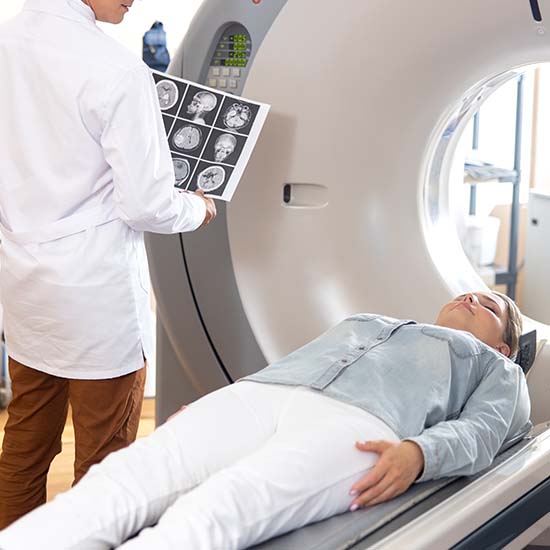
Book PET Viability Scan Cardiac Appointment Online Near me at the best price in Delhi/NCR from Ganesh Diagnostic. NABL & NABH Accredited Diagnostic centre and Pathology lab in Delhi offering a wide range of Radiology & Pathology tests. Get Free Ambulance & Free Home Sample collection. 24X7 Hour Open. Call Now at 011-47-444-444 to Book your PET Viability Scan Cardiac at 50% Discount.
Positron Emission Tomography (PET) viability scan cardiac is the imaging test that uses radioactive tracers to detect the damage caused by a heart attack or heart disease. The test will give the current condition of the heart and help for further treatment needed.
This imaging test gives a detailed description of the heart after a heart attack or heart disease. This helps the healthcare expert to determine whether the patient needs cardiac bypass surgery, angiography, heart transplant or other related procedures for the condition to be treated.
Radiologists will inject a radioactive tracer (either rubidium-82 or ammonia-13) into patients' bloodstream and tie it (if needed) to a narrow moving table before inserting it into a highly advanced scanner. The scanning machine takes around 30-45 minutes to capture the images of the targeted area with the help of a computer.
Patients are advised to avoid a carbohydrate-rich diet before 24 hours and observe fasting as instructed by the Radiologist (basically 6-8 hours) before undergoing the test. Leave all metal items at home and wear loose and comfortable clothes.
It is a comparatively safe test to undergo. However, maintain a safe distance from ladies and children for the next few days. Drink a lot of water to drain radioactive tracers.
This test price for PET viability Scan Cardiac test ranges from INR 14000 to INR 28000. Patients should visit the certified centre for the procedure. The test price may vary as per the area and the healthcare facility.
To provide hassle-free diagnostic service we also provide online service to book your appointment. At Ganesh Diagnostic, you can book a PET Viability Scan Cardiac Test online by scheduling your appointment. Quick, non-invasive PET CT appointment is available for detailed insights into your body. Schedule now for a comprehensive health assessment. We are 24/7 Open at your service.
| Test Type | PET Viability Scan Cardiac |
| Includes | PET Viability Scan Cardiac (PET Scan) |
| Preparation |
|
| Reporting | Within 24 hours* |
| Test Price |
₹ 14000
|

The PET Viability Imaging is a Positron emission tomography (PET) viability imaging, which is used to further assess how much could the heart muscle could be damaged by heart attack or due to any heart disease.
This test is also used to determine whether the patient would be requiring angiography, any cardiac bypass surgery, the heart transplant or any other procedures.
There are known to be two parts to this viability test.
The two sets of PET images are reviewed together.
It is amongst a few imaging tools for which some limits have been imposed— currently, there are about three follow-up PET scans per individual, even when the doctors have only ordered them after detecting an anomaly on computed tomography (CT) scan.
It is seen that drinking plenty of the fluid post scan would help in flushing the radioactive material from the body.
As a precautionary measure, you are also advised to avoid any prolonged close contact with any pregnant women, with any babies or any young children for at least few hours after the PET scan, as one might be slightly radioactive during this period of time.
The images can be reviewed along with the appropriate medical history, any other imaging technique, reported by Ganesh Diagnostic and Imaging Center by the Nuclear Medicine Radiologist or the Nuclear Medicine Physician.
Please ensure that a follow up appointment has been made with the referring doctor to further discuss your test results.
On day of the test
There is some sort of fasting required. For about six hours prior to your test: You are advised to not eat or even drink anything, except for water.
You can also take other usual medications unless and otherwise it is directed by the physician.
You are requested to bring all of the medications along with you in its original form.
Patient is advised to go for the PET Viability Scan Cardiac test after a heart attack or heart disease.
There are no such risks associated with a PET Viability Scan Cardiac test when conducted in the presence of a healthcare expert and at a good healthcare facility with proper guidelines and protocols.
The price of a PET Viability Scan Cardiac test in Delhi NCR typically ranges from INR 14000 to INR 28000 in Delhi NCR.
Patients can type the PET Viability Scan Cardiac test near me in Google search for the nearest centres available.
Early check ups are always better than delayed ones. Safety, precaution & care is depicted from the several health checkups. Here, we present simple & comprehensive health packages for any kind of testing to ensure the early prescribed treatment to safeguard your health.